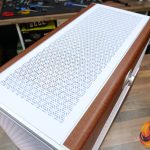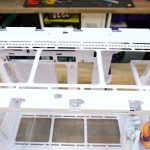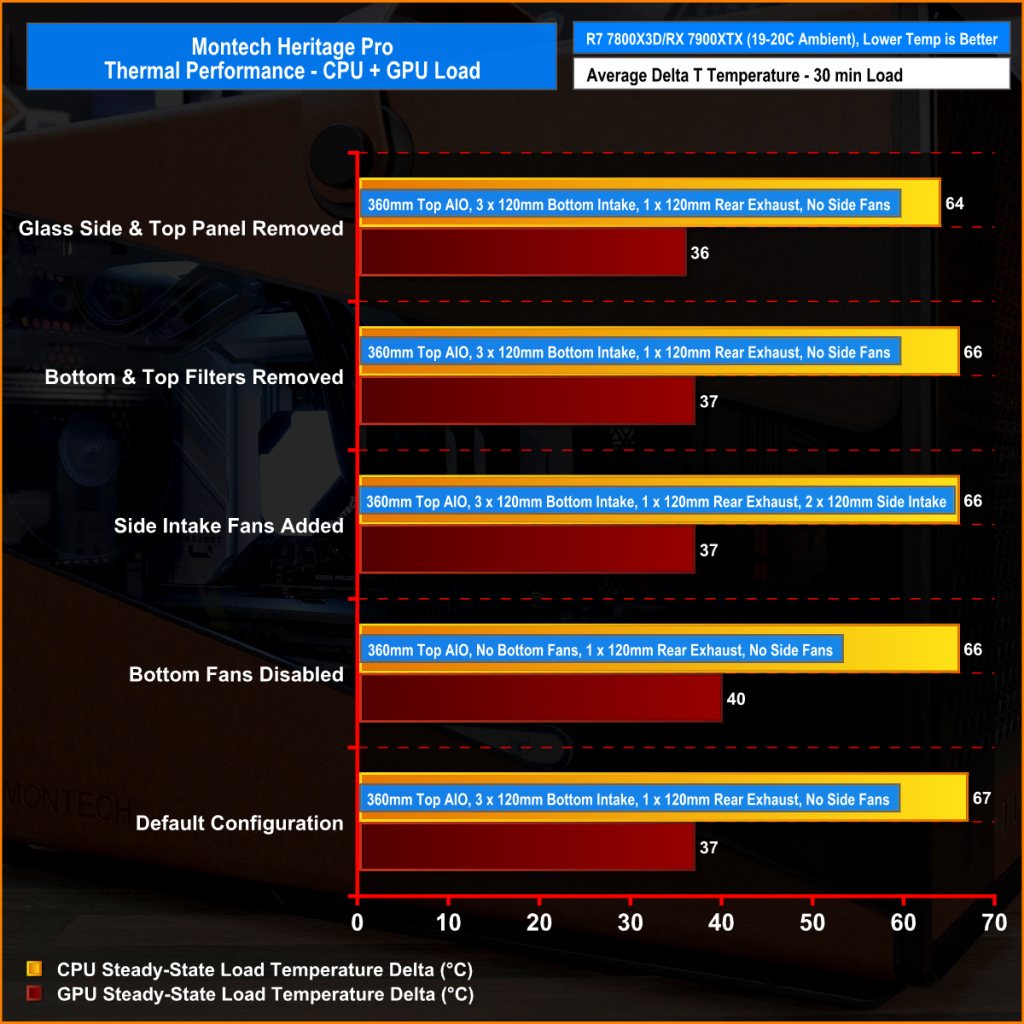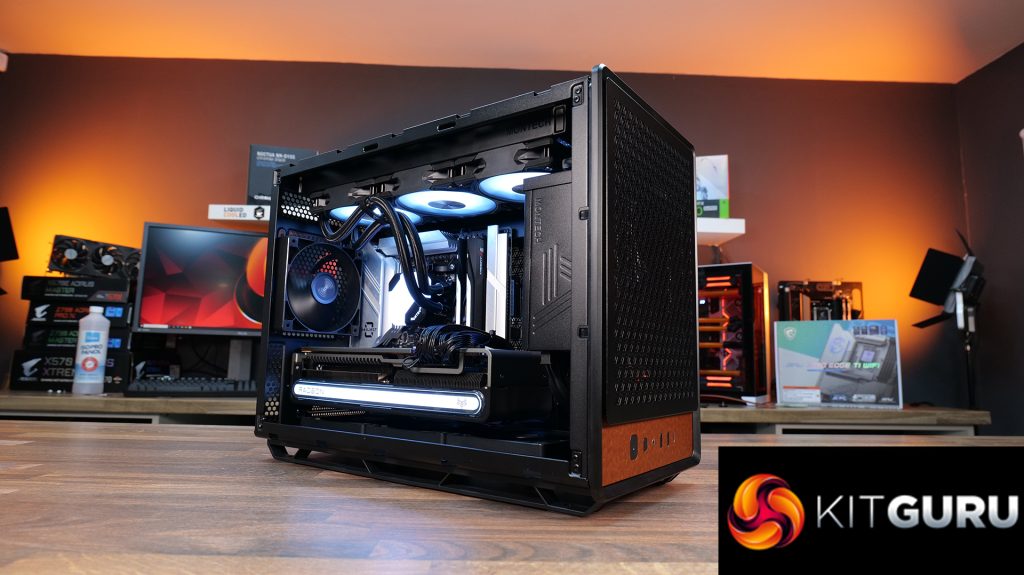Montech Heritage Pro Case Review
Montech is kicking off the new year with a new case launch. It's called the Heritage or Heritage Pro, depending on the SKU you choose. It supports Micro ATX motherboards including back connect, large graphics cards, 360mm radiators, nine 120mm fans and ATX power supplies – all packed into a small form factor. Today we will be taking a closer look at the Heritage Pro and going over it with a fine-tooth comb to find out if it lives up to Montech’s recent high standards.
Timestamps:
00:00 Start
00:36 Overview and pricing
02:08 A closer look / removing panels
04:22 Front I/O
04:48 Pro Version – fans / cooling / HW support
07:18 Rear and right hand side
08:30 Front
09:05 Floor
09:44 Accessories
11:36 Test System build
12:52 Thermal and noise performance
14:45 Installation and closing thoughts










Montech Heritage Pro Features:
- According to Montech, the Heritage Pro offers a unique blend of luxury material and high-performance engineering with a fusion of leather and metal, as well as signature elements like the suitcase-style leather carrying handle making it perfect for gaming setups and professional environments.
- Heritage features compact dimensions with support for Micro ATX motherboards, long graphics cards, 360mm AIO radiator installation, up to nine 120mm fans and ATX power supplies.
- The Heritage Pro also includes a versatile accessory bracket that can be attached to the handle connection, perfect for hanging headphones or other items. It also includes four 120mm Montech GF 1 x forward pre-installed and 3 x reverse fans.
Specifications:
- Case Type: Micro ATX
- Dimensions (LxWxH): 480 x 235 x 368mm
- Material: Steel, Leather, Glass, Plastic
- Motherboard Support: Micro-ATX
- Expansion Slots: 5
- Storage bays:5” x 1, 2.5” x 2
- Max GPU Length: 400mm
- Max CPU Cooler Height: 170mm
- Max PSU Size: ATX Up to 165mm
- Pre-installed fans: 4 x Montech GF 120mm
- Fan Support: 3 x 120mm/2 x 140mm (Top) 2 x 120mm (Right Side) 1 x 120mm (Rear) 3 x 120mm (Bottom)
- Radiator Support: 120 / 140 / 240 / 280 / 360mm (Top) 120mm (Rear)
- Dust Filters: Top, Bottom
- Font I/O: 2 x USB 3.0 Type-A, 1 x USB 3.2 Gen 2×2 Type-C, 1 x combined 3.5mm audio jack, Power and reset buttons
- LCD Screen: N/A










Thermal Performance Testing
To simulate thermal demand we run the Cinebench R23 multi-thread benchmark and 3DMark Speed Way stress test simultaneously in a loop for 30 minutes to load the system fully. This gives the CPU and GPU enough time to reach constant steady-state temperature. With this data, we can compare how the system handles the thermal demand and measure peak noise levels.
Thermal performance is measured with the case in various configurations, such as the default, with the tempered glass left-hand side panel removed and with the front panel removed to see how these configurations affect the CPU and GPU temperature. During testing, only stock case fans are used unless otherwise specified. All water pumps are set to maximum RPM and fans are set to a custom RPM curve by the Motherboard software/BIOS.
All temperature measurements are presented as Deltas – meaning the ambient temperature has been deducted from the CPU temperature giving us a Delta. Data shown in the charts represent the average component temperature over the length of the test as measured by HWiNFO and then the last 15 minutes of the data are calculated to get the average. The ambient temperature during thermal tests is between 19-20⁰C.
Test System Specification:
- CPU – AMD Ryzen 7 7800X3D
- Motherboard – MSI B650M Project Zero
- Graphics Card – Sapphire Radeon RX 7900XTX Nitro+
- Memory – 64GB (2 x 32GB modules) G.SKILL Trident Z5 RGB DDR5-6400
- Storage – 1TB Corsair MP700 PCIE Gen 5 M.2 NVMe SSD
- CPU Cooler – Montech HyperFlow ARGB 360
- Power Supply – Montech Titan Gold 1000W
- Case fans – Stock Montech GF 120mm PWM
- Chassis – Montech Heritage Pro
- Operating System – Windows 11
Thermal Performance Overview
We tested the case thermals with a 360mm AIO CPU cooler installed in the roof and with the case in several different configurations. The default configuration shown in the charts is with a 360mm roof-mounted AIO, the stock case fans installed (3 x floor intake, 1 x rear exhaust) and all case panels fitted.

For a compact Micro ATX case the Montech Heritage Pro does OK when it comes to thermal performance. In the default configuration, CPU load temperature averages 67°C over ambient while the GPU sits comfortably 37°C over ambient, which is normal for this CPU and GPU combination even in larger ATX size cases.
Removing panels and dust filters has only a small effect on thermals. The best results are achieved with the side and top panels removed, effectively making the case an frame open. But even then, the CPU temperature drops by only 3°C, and the drop in GPU temperature change is within the margin of error at 1°C.
Adding side intake fans doesn’t affect either the CPU or GPU temperature since the side fans are partially blocked by the power supply anyway. We wouldn’t recommend adding side fans as the extra cost will provide minimal or no gains. However, bottom intake fans are useful since removing them increases GPU temperature by 3°C.

The stock fans that come with the Montech Heritage Pro are not the quietest. To get the fans running at an acceptable noise level at idle the fan speed had to be reduced to around 850RPM. But under load the AIO fans have to work quite hard to keep CPU temperature cool so the noise output of the system under load is quite loud in certain configurations.
Disabling bottom intake fans increases noise as the AIO fans have to ramp up higher in this configuration to keep CPU temperature controlled. Removing the glass side and top panels increases noise under load too so they offer some noise dampening when fitted to the case. But the optimal configuration for noise is the default, with bottom intake fans, no side fans and all case panels fitted which is the preferred configuration for thermals too.
Closing Thoughts
It's great to see Montech try something different with the Heritage and Heritage Pro case. There’s a lot of the same-looking cases being regurgitated over and over lately, we see loads of either mid-tower and mesh or dual chamber and glass cases, so this combination of mATX form factor, metal and leather is a refreshing change, even if it's not quite my cup of tea. Aesthetics is a personal thing and very subjective but I am sure this case will be like Marmite, you’ll either love it or hate it, in terms of the looks anyway.
As far as practicality goes it's OK but I think it could be improved. It’s a little too big to be seriously classed as a portable case, there are plenty of other cases of similar style, smaller and more portable while offering very similar specs and hardware support. The side fans seem like a bit of an afterthought as the airflow is mostly blocked off by the PSU and it’s a similar story with the accessory hook, especially on the white case as it looks out of place.

Bottom-mounted 120mm fans are a very tight fit if you are using an MSI Project Zero motherboard, in our test system the fans fouled the motherboard which could cause some issues with vibration and unnecessary noise; the choice of dust filter placement is very odd too. Montech has put filters in places where they are not needed like the top panel and left them out where they would be useful like the front and side vents. The plastic feet are not great quality either and have a lot of flex.
However, the build quality of the rest of the case seems up to Montech’s usual high standard, the cooling in the default configuration works well, GPU temperature is particularly good and it supports high spec hardware including big graphics cards, 360mm radiators, up to nine 120mm fans and ATX power supplies. But the stock fans that come with the Heritage Pro are a bit loud, the accessory handle isn’t great, so if you are planning on buying this case I would recommend going for the standard (cheaper) version and adding your own quieter fans.
The Montech Heritage and Heritage Pro can be purchased now from Scan priced at £58.32 for the standard version and £74.99 for the Pro version.
Pros:
- Good cooling and hardware support.
- Cable management is good even with the non-standard layout.
- Back-connect motherboard support works well.
- Different aesthetics – it's good to see Montech trying something new.
Cons:
- Side fans blocked by the power supply.
- No front and right side dust filters.
- Plastic feet have a cheap feel.
- It's too big to be seriously classed as portable.
KitGuru Says: If you want a refreshing change and like leather then this might be the perfect case for you but if you want a portable case there are other more compact options available that are just as good.
The post Montech Heritage Pro Case Review first appeared on KitGuru.